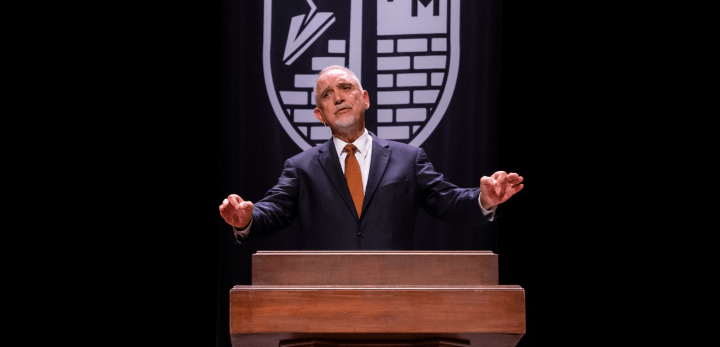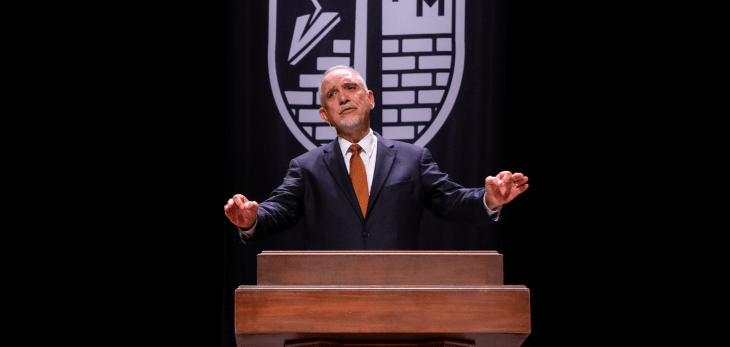The most conservative wing of the Southern Baptist Convention bypassed the denominational news service in favor of a conservative political outlet March 22 to announce its slate of two candidates for office when the SBC gathers this June.
As if to underscore the anti-institutional nature of their campaign, Tom Ascol and Voddie Baucham broke their news through The Daily Wire, which describes itself as “one of America’s fastest-growing conservative media companies for breaking news, investigative reporting, sports, podcasts, in-depth analysis, books, and entertainment for a reason: because we believe in what we do. We believe in our country, in the value of truth and the freedom to speak it, and in the right to challenge tyranny wherever we see it.”
For decades, such announcements have originated through the denomination’s official news service, Baptist Press.
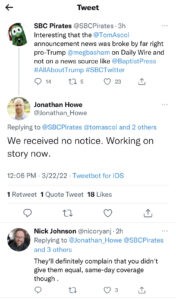 In a public Twitter thread, a group called SBC Pirates noted: “Interesting that the @TomAscol announcement news was broke by far right pro-Trump @megbasham on Daily Wire and not on a news source like @BaptistPress #AllAboutTrump #SBCTwitter.”
In a public Twitter thread, a group called SBC Pirates noted: “Interesting that the @TomAscol announcement news was broke by far right pro-Trump @megbasham on Daily Wire and not on a news source like @BaptistPress #AllAboutTrump #SBCTwitter.”
To which the SBC Executive Committee’s vice president for communications replied: “We received no notice.”
The Ascol and Baucham ticket
The news that then dominated Twitter for Southern Baptists the rest of the day is this: After unsuccessfully floating the nomination of author and seminary professor Voddie Baucham for SBC president, the most stridently conservative faction within the denomination has decided instead to nominate its best-known firebrand, Tom Ascol.
But Baucham — who, it turns out, is not eligible to serve as SBC president because he is not a current member of an SBC church — still factors into the picture. He now will be nominated to lead the SBC Pastors’ Conference, a separate group that meets in conjunction with the SBC and mainly is an evangelistic pep rally for pastors with hours of sermons separated by a bit of music.
Because it precedes the SBC annual meeting usually by a day, the Pastors’ Conference often sets the tone for whatever agenda its leadership hopes to see accomplished within the SBC. From the time of the so-called “conservative resurgence” that began in 1979, the Pastors’ Conference has been used as a pre-game political pep rally wrapped in evangelism.
An irony this year, however, is that the Conservative Baptist Network — a group generally supportive of Ascol and Baucham — already has scheduled its own event on Sunday night, June 12, competing with the opening session of the Pastors’ Conference.
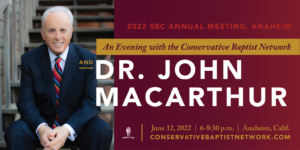 On that night in Anaheim, Calif., the Pastors’ Conference will begin its lineup of at least 13 back-to-back preachers at the Anaheim Convention Center while across the street the Conservative Baptist Network will gather at the Marriot Anaheim to hear from John MacArthur, the legendary and controversial pastor of Grace Community Church in Los Angeles. MacArthur is arguably the best-known advocate for a brand of neo-Calvinism that is shared by the Conservative Baptist Network and another group called Founders Ministries that is led by Ascol.
On that night in Anaheim, Calif., the Pastors’ Conference will begin its lineup of at least 13 back-to-back preachers at the Anaheim Convention Center while across the street the Conservative Baptist Network will gather at the Marriot Anaheim to hear from John MacArthur, the legendary and controversial pastor of Grace Community Church in Los Angeles. MacArthur is arguably the best-known advocate for a brand of neo-Calvinism that is shared by the Conservative Baptist Network and another group called Founders Ministries that is led by Ascol.
In perhaps another sign of the times, both meetings will be held within walking distance of Disneyland, and the SBC is offering discounted Disney tickets to convention-goers. In 1996, the SBC famously led a boycott of Disney because of its “gay-friendly” policies and “anti-Christian” messages. Later research reported by BNG showed the boycott was a flop but did raise the profile of the SBC leaders behind it.
One of the major wedge issues between current SBC leadership — which is conservative by any external standard — and the groups supporting Ascol and Baucham is fear that the SBC is sliding into “liberalism” and its leaders are being too influenced by a “woke” agenda that is feminizing men and challenging male authority.
A nominating statement
The Daily Wire report linked to a statement from 11 SBC leaders, including Mike Stone, the losing candidate in last year’s presidential election who was endorsed by the Conservative Baptist Network. Most of the other 10 signers also are affiliated with the Conservative Baptist Network.
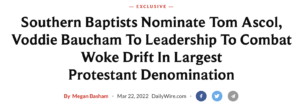 The “Statement Nominating Tom Ascol and Voddie Baucham” asserts the SBC “badly needs a change of direction. While baptisms and evangelism continue their freefall, a small group of leaders steers our institutions ever closer to the culture, from radical feminism masked as ‘soft complementarianism’ to the false gospel of Critical Theory and Intersectionality. In Christ there is no Jew or Greek, there is no slave or free, we are all made one in him. But this ‘Race Marxism’ divides everyone by their most superficial features, in a never-ending cycle of recrimination and hate.
The “Statement Nominating Tom Ascol and Voddie Baucham” asserts the SBC “badly needs a change of direction. While baptisms and evangelism continue their freefall, a small group of leaders steers our institutions ever closer to the culture, from radical feminism masked as ‘soft complementarianism’ to the false gospel of Critical Theory and Intersectionality. In Christ there is no Jew or Greek, there is no slave or free, we are all made one in him. But this ‘Race Marxism’ divides everyone by their most superficial features, in a never-ending cycle of recrimination and hate.
“We reject these worldly dogmas. We stand together on the Baptist Faith and Message. We proclaim the sufficiency of Scripture. And we know the vast majority of Southern Baptists do too. At this critical juncture, we need men to serve who can unite our convention around the gospel of Jesus Christ. We believe there are no two better men to lead us in this vital task than Tom Ascol and Voddie Baucham.”
The statement takes specific aim at the Pastors’ Conference, which it describes as “an event which in recent years has shifted radically from one of the high points of the entire year into what many have termed ‘Woke Fest.’ The importance of restoring that pivotal event cannot be overstated. And God is not Woke. The Baptist in the pew isn’t either. But that won’t mean anything if we don’t show up, and vote.”
“God is not Woke. The Baptist in the pew isn’t either. But that won’t mean anything if we don’t show up, and vote.”
In addition to Stone, other signers include Lee Brand, current first vice president of the SBC; Tom Buck, a frequent SBC critic and senior pastor of First Baptist Church of Lindale, Texas; Javier Chavez, senior pastor of Amistad Cristiana International in Gainesville, Ga.; Kelvin Cochran, vice president of the legal advocacy group Alliance Defending Freedom; Mark Coppenger, former president of Midwestern Baptist Theological Seminary; Greg Davidson, senior pastor of Trinity Baptist Church in Vacaville, Calif.; Mark DeVine, associate professor at Samford University’s Beeson Divinity School in Birmingham, Ala.; Brad Jurkovich, senior pastor of First Baptist Church of Bossier City, La., and leader of the Conservative Baptist Network; Ronnie Rogers, senior pastor of Trinity Baptist Church in Norman, Okla.; and Carol Swain, former professor of political science and law at Vanderbilt University.
One other candidate for SBC president already has been announced. That is Willy Rice, pastor of Calvary Church in Clearwater, Fla. Rice is positioned as a traditionalist candidate. He currently serves as a trustee of the SBC North American Mission Board, is a past president of the Florida Baptist Convention, served as president of the SBC Pastors’ Conference in 2015, chaired the 2010 SBC Committee on Committees and chaired the 2016 SBC Committee on Nominations. He delivered the convention sermon at last summer’s SBC annual meeting where Litton was elected.
Who is Tom Ascol?
When conservatives began their push to reshape the old SBC in 1979 — the movement organized by Paul Pressler and Paige Patterson as the “conservative resurgence” — Ascol already was on the conservative side of the debate. However, at that time, he lived on the far-right fringe of the denomination because of his embrace of Calvinism.
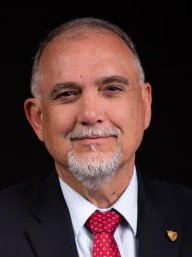
Tom Ascol
Only in the ensuing years of conservative domination of the SBC, and particularly with the rise of fellow Calvinist Al Mohler to lead the denomination’s flagship seminary, did Calvinism once again become mainstream within a segment of the SBC. Mohler and Ascol and their tribe believe they represent the theological views of the SBC’s founders. Thus, Ascol’s group is called Founders Ministries.
After running off all the left wing and most of the moderate wing of the SBC, the convention was left with a national body that sits even further right on the American political and theological spectrum than it did before. To say that the SBC is conservative is as safe as to say that Republicans favor lower taxes.
Today’s SBC — much like the Republican Party in America — faces a new fracture among conservatives. The current leadership, exemplified by SBC President Ed Litton — who won office by less than a 600-vote margin — leans toward institutional loyalty and often tries to be congenial yet firm in its relations with “the world,” as evangelicals like to describe secular culture.
This fracture widened during the Trump administration, although polling data show the vast majority of Southern Baptists to be Trump voters. The difference, then, is more about those who are proud to be Trump voters and those who held their noses and voted for Trump twice because of their views on abortion.
Count Ascol among the proud Trump voters. His Twitter feed and other writings are filled with condemnations of the Biden administration, praise for Republican social and political agendas and diatribes against the “woke.”
What he brings to the conversation is not just political conservatism, however, but also a theology of male headship and the kind of certainty about everything that often befalls Calvinists. This has made him a hero to his admirers but a verbal bomb-thrower to more traditional conservatives in the SBC.
“What he brings to the conversation is not just political conservatism, however, but also a theology of male headship and the kind of certainty about everything that often befalls Calvinists.”
As for basic biography, Ascol has served as a pastor of Grace Baptist Church in Cape Coral, Fla., since 1986. He earned a bachelor of science degree in sociology from Texas A&M University and the master of divinity and doctor of philosophy degrees from Southwestern Baptist Theological Seminary.
He has served as an adjunct professor of theology at Reformed Theological Seminary, Covenant Baptist Theological Seminary, African Christian University, Copperbelt Ministerial College, and Reformed Baptist Seminary.
In addition to being president and chief spokesperson for Founders Ministries, he is editor of the group’s Founders Journal, a quarterly theological publication. He also hosts a weekly podcast called The Sword and The Trowel.
Why he is willing to serve
For decades, Ascol has been an organizer and advocate, sometimes behind the scenes and sometimes visible, but never in a formal elected role within the convention.
When his nomination for the presidency was reported March 22, he soon after published his own online statement under the headline “Why I Am Willing to Be Nominated for SBC President.”
He wrote: “The Southern Baptists Convention needs a change of direction. Over our 177-year history the Lord has enabled the churches of the SBC to accomplish some amazing things for the kingdom of God. But over the last few years, the good work that our association of churches is doing has been somewhat disrupted and is in danger of being derailed by the subtle infiltration of secularism and godless ideologies into our ranks. I am convinced that the vast majority of Southern Baptists do not want to see their convention (the largest Protestant denomination in America supporting the largest Christian missionary force in the world and educating one-third of this nation’s seminary students) follow the path of our increasingly secular culture.”
“The good work that our association of churches is doing has been somewhat disrupted and is in danger of being derailed by the subtle infiltration of secularism and godless ideologies into our ranks.”
He recited a list of ways he has spoken against and tried to call the SBC to speak against Critical Race Theory, the current buzzword in conservative political circles to encompass a wide array of concerns about the teaching of race and racial history in schools.
Those efforts, he said, include leading in convening a council that produced the Dallas Statement on Social Justice and the Gospel in 2018, an event that preceded and perhaps sparked the attention of then-President Donald Trump’s adoption of a similar campaign message. Ascol also has been front and center in the SBC’s own debate about two resolutions on Critical Race Theory, in 2019 and in 2021.
He and his organization helped produce a short documentary film titled “By What Standard: God’s World … God’s Rules,” which he describes as documenting “many of the ways that godless ideologies have infiltrated our ranks.”
Ascol also has been outspoken on perceived mistreatment of denominational employees by administrators, response to the pandemic and other internal SBC issues.
He describes himself as “an ordinary pastor of a regular-sized SBC church” who “never aspired to serve as president of the SBC or in any other denominational office.”
Then he adds: “But God, in his inscrutable providence and through my involvement with Founders Ministries, has put me in a position to engage various issues … . Over the years I have been repeatedly encouraged by pastors across the SBC to ‘run’ for the presidency. It has been easy to politely dismiss those requests until recently.”
“But God, in his inscrutable providence and through my involvement with Founders Ministries, has put me in a position to engage various issues.”
With the blessing of his wife and church elders, he is now willing to be nominated, he said. “If the Lord would be pleased for me to serve as the president of the SBC, then I will do my best to do so in ways that help us change the direction where it is needed so that we can better carry out our joint mission of making disciples of all nations, baptizing them, and teaching them to observe all that King Jesus prescribes.”
A new idea for Baucham
Just a few weeks ago, Ascol and those around him were floating the idea of Baucham being nominated for SBC president. That story, which was first reported by BNG, generated a firestorm of enthusiasm and protest.
Baucham is beloved by some and derided by others because of his preaching, writing and teaching based on a Calvinistic theology that blends male headship with denial of scientific facts and historical facts. But what doomed his potential nomination for the SBC presidency is the fact that he is not a member of an SBC church, and the denomination’s bylaws require officers to be members of SBC churches.
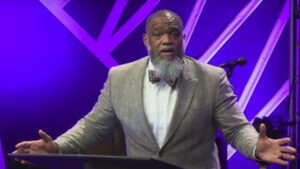
Voddie Buchmann
Although he previously served as pastor of an SBC church in Houston, Baucham now serves as dean of the School of Divinity at African Christian University in Lusaka, Zambia. And he previously explained that because he does not believe in what Baptists call “non-resident church membership,” he no longer is a member of that Houston church while serving in Zambia. His church in Zambia is not an SBC church. Although the SBC has started and supports thousands of congregations across the world, none of them are considered SBC churches for purposes of convention membership.
Apparently, no such limitation applies to the elected officers of the Pastors’ Conference, although BNG was not immediately able to review the group’s governing documents.
Baptist Press reported that Baucham’s former Houston church, called Grace Family, contributed just $500 through the SBC Cooperative Program unified budget in 2021, which was the church’s first CP gift since 2014.
BP further reported that both the university where Baucham now serves and the church where he is a member are affiliated with Reformed Baptists of Zambia.
Regarding the Pastors’ Conference, BP reported: “It is unclear whether Baucham’s lack of membership in a Southern Baptist congregation precludes his nomination. The conference has no organizing documents or stated qualifications for its officers.”
Although not technically a Southern Baptist, Baucham serves on the board of Founders Ministries and on the Conservative Baptist Network’s steering council.
The formal statement from a group of 11 SBC leaders announcing Baucham and Ascol’s candidacy described Baucham as an “SBC missionary,” which also is misleading. The SBC appoints missionaries through its International Mission Board, and Baucham is not one of those duly appointed missionaries and the seminary where he teaches is not affiliated with the IMB.
Related articles:
Plagiarism is the least thing to worry about with Voddie Baucham, who is a threat to children, women and daughters | Opinion by Rick Pidcock
Who’s behind the nationwide attacks on local school boards over Critical Race Theory?
‘Bindergate’ story shows the behind-the-scenes struggle for unity versus strict orthodoxy in SBC
Could newly elected SBC president be forced to resign over sermon plagiarism?

